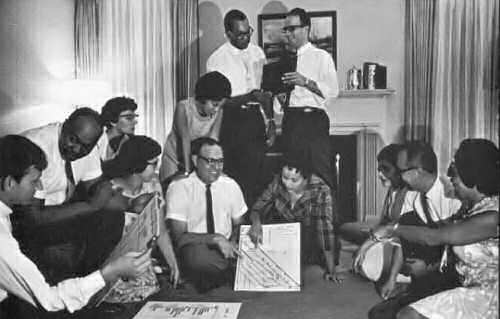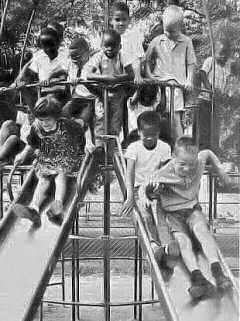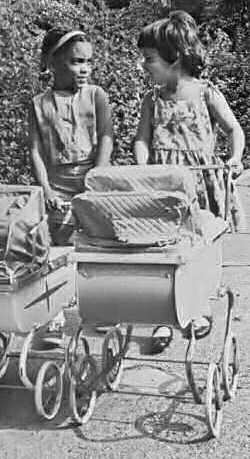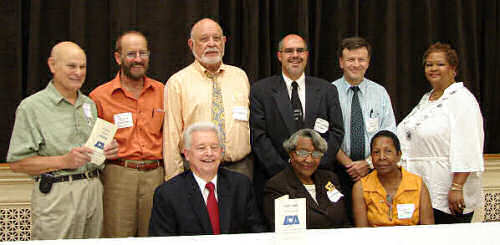
|
Making a neighborhood what you dream it to be
Ludlow Community Association looks back on
a half century of never
giving up
Thursday, September 27, 2007
By Marie Catanese
Cris Branche moved
to Albion Road in 1956, less than one year after
the first black family moved to Ludlow.
That same year, a
bomb exploded in a resident's garage and "For
Sale" signs began to sprout like weeds through
the 500-home community just east of Shaker
Square.
Thirty years old
and pregnant with her first son, Branche was not
expecting to become a suburban pioneer.
"We didn't have the
sense to know yet that that was a big deal," Branche told the
audience at the Ludlow Community Association's 50th anniversary
celebration earlier this month. "We just needed to find a bigger
house."
The house that she found was the only one on the entire street that
was not subject to the restrictive Van Sweringern covenants that
required black families to get the signatures of all their neighbors
before they could buy.
And it was a filthy house, Branche recalled, with ropes of dirt
hanging from the ceiling like fuzzy snakes, but she was not afraid
of a little work.
Nor was she intimidated by being one of the first black families in
town.
"Just get us the house and we'll take care of the people," she
thought.
|
|
 |
Ron Spetrino, standing facing left,
hosts a meeting of the Ludlow Community Association in his Onaway
Road home. This photograph comes from a brichure entitled "Cosmopolitan
Pioneers" produced in the mid 1960s.
|
|
Making
neighbors
In exchange for a cool glass of water, her new mailman told her the
news folks down the street were meeting in secret to discuss their
new neighbors. But out of the violence, the fear and the new danger
known as "blockbusting" the Ludlow Community Association was born.
Formed in 1957 in a bold attempt to stabilize their neighborhood
through inclusiveness and balance, the association became a national
success story in integration.
Together, black and white families agreed that if they could get
white families to buy in Ludlow, they could combat the rumors that
the community was turning into a ghetto.
|
When real
estate companies told them it was a lost cause, they
sold bonds and raised money to help families with high
down payments.
When people said it couldn't be done, they simply worked
harder and met more frequently.
Between the fall of 1964 and the spring of 1967 the
residents of Ludlow raised $30,000 from three
fundraisers alone.
Past president Ron Spetrino, another speaker at the
Sept. 8 anniversary event, was the mastermind behind
LCA's biggest fundraising efforts.
In the fall of 1964 the association bought out the
entire Shaker Square theater for the opening night of
"My Fair Lady."
They sold out the theater, raised $5,000, and at least
25 percent of the entire community was involved in
selling the tickets.
In 1982, on LCA's 25th
anniversary, Ludlow Elementary School was perfectly
balanced with 50 percent black students and 50 percent
white students. |
|
 |
"At that point the
community was intoxicated by its own success," Spetrino said. "And
LCA was growing in stature to both its residents and to the greater
Cleveland community as both a viable and valid organization working
for integrated housing."
|
|
Defining community
|
 |
|
Another
past president, Alan Gressel, came to Ludlow in 1960 and
ran the housing program until the city took it over in
1967.
He never
made a commission from a home that he sold.
"The important thing to understand about the housing
program is that what we were selling was not the house.
We were selling the community," Gressel said. "Selling
the community meant selling the school. It meant selling
the idea of integration."
And even during the bitter closing of Ludlow School in
1987, the LCA stayed strong and supported the school
board's difficult decision.
Ludlow resident Carolyn Milter, another anniversary
speaker, served on the school board when the choice was
made.
"It hurt then, and it still hurts 20 years later that I
voted to close Ludlow School," Milter said, close to
tears. "But how proud I am that LCA supported that
decision." |
|
L-R
Laurie Franklin, Lynn Spetrino |
|
|
'What you
dream'
For the many who remember Ludlow's hardest days, the 50th
anniversary was an emotional gathering.
But for the current co-presidents, 2007 is also the time to talk
about the future of this once vibrant organization.
When Dr. Tom Chelimsky moved into Ludlow, he knew nothing of his
neighborhood's rich history.
Now, as an LCA co-president since 2002, he's hoping to rekindle the
Ludlow spirit toward a new model the intergenerational community.
"The neighborhood becomes what you dream it," Chelimsky said. "This
community would be one where I, at least, would spend the rest of my
days."
Cris Branche knows exactly what he means.
"I am 80 years old and I am grateful to be upright and still living
in the same house," she said.
|
|
 |
|
Some of LCA's past
and present presidents are, standing left to right, Lou Salvatore,
Ron Spetrino, Alan Gressel, Luis Coelho (current), Tom Chelimsky
(current) and Jarmellia Armwood. Sitting from left to right are Ken
Kovach, Emma Benning and Gren Chapman (current)
Photo by Gisela Chelimsky
|
© 2007 The
Sun Press - Sun News Used with permission.
To read this story of the Sun-Press website,
click here.
Contact Catanese at marie.catanese@yahoo.com or (216) 986-5865. |
|




